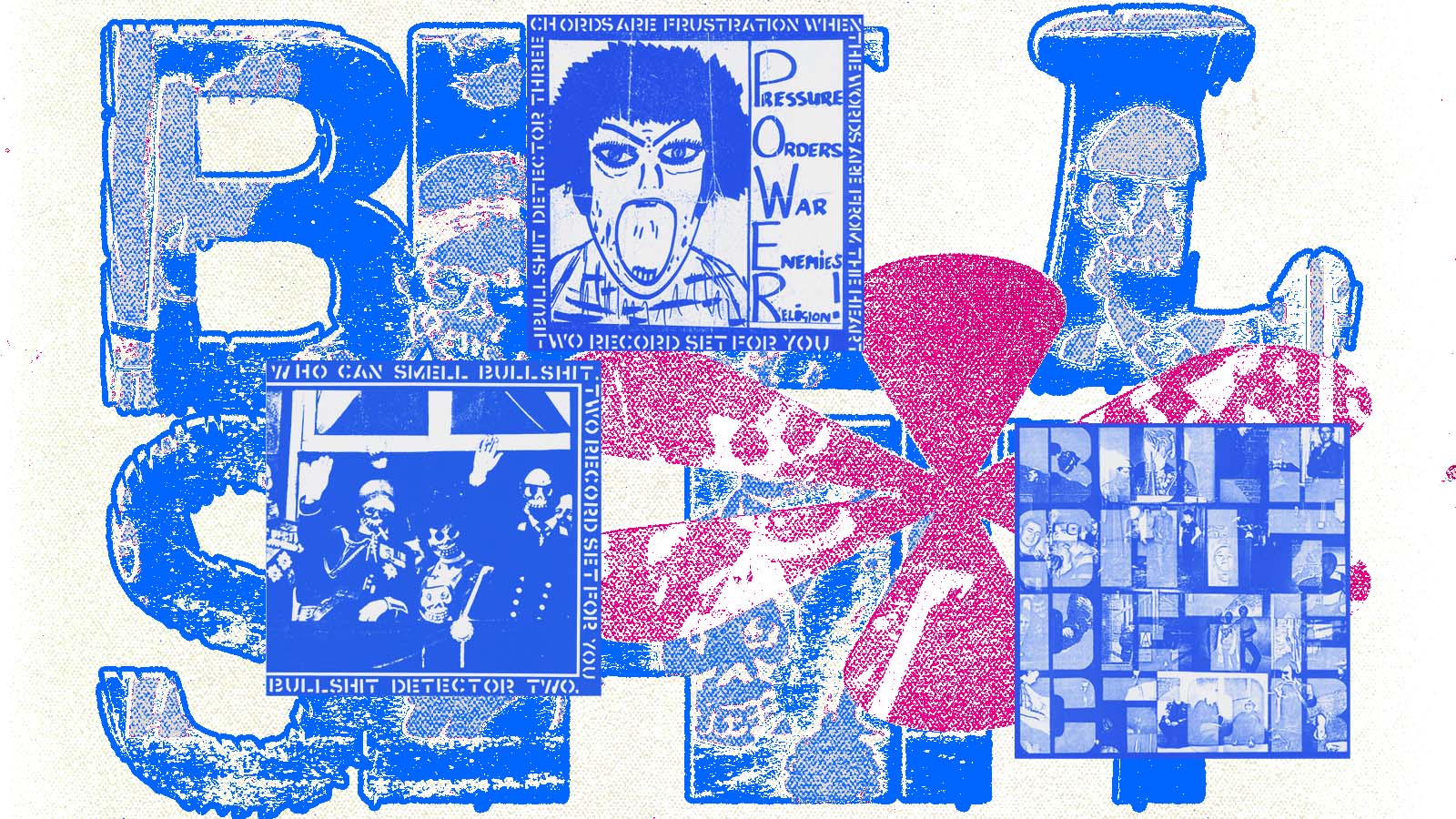
There was no one single band that instigated punk rock. The Ramones set the musical template and Sex Pistols lit the fuse, but in the hands of the Sex Pistols, anarchy was merely a slogan. For the Essex group Crass, it was an ideal for living. Between the years of 1977 and 1984, the group fired a volley of incendiary albums from their home base Dial House, an open community operating out of a 16th century farmer’s cottage on the outskirts of Epping Forest in rural Essex. Crass’s music straddled punk, spoken word, improvisation, and the avant-garde. Their lyrics were angry, literate, sometimes satirical, addressing pacifism, feminism, animal rights, systems of control, and the way that the revolutionary possibilities of punk had been co-opted by corporations and chancers out to make a quick buck.
As Crass founder member Penny Rimbaud puts it, Crass were for the people.
People would ring up and say, ‘Why haven’t you been to Swansea to play?’ And we’d say, ‘Find us somewhere to play that isn’t a commercial gig and we’ll come and play.’ We ended up playing church halls, Nissen huts, all sorts of things. The idea was to give, and to contribute to alternative things that were happing across the country. If we had surplus money, we’d contribute it to something in the community. I think it was the beginning of the punk movement. The punk movement in the hands of The Stranglers or The Damned was towards the bank. Whereas the real punk music movement was bricks through the window of the bank.
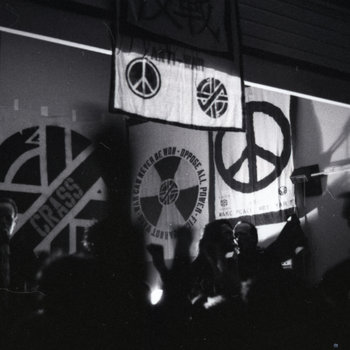


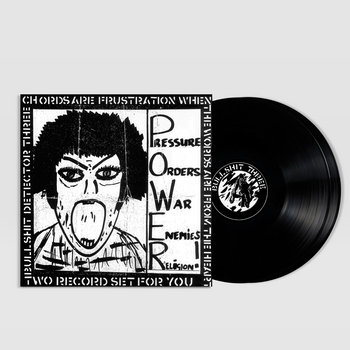




Vinyl LP, Vinyl Box Set




Crass’s own label, Crass Records, began as a means of releasing their own music without the mediating influence of a record label. But the appearance of music by other artists—1979’s “You Can Be You” by teenage runaway Honey Bane, and the following year’s “You Can’t Cheat Karma” by the Reading-based group Zounds—proved that Crass were interested in amplifying other voices, too. It wasn’t long before cassettes started dropping through the letterbox. “Some we liked, but maybe it wasn’t quite good enough for a full vinyl release, or there wasn’t enough material, or we thought it wouldn’t sell,” remembers Crass vocalist Steve Ignorant. “We felt these bands should be given an opportunity. That’s where the idea came from. We’ll take one track from each cassette, the ones that are really good, and we’ll compile them all together.”
The result was Bullshit Detector. Released on Crass Records in 1980, the compilation collected 25 tracks by bands from across the UK. The sound quality is notoriously variable—the tracks were literally spliced together using audio from the cassettes dropped off by the Royal Mail, with little additional mixing or mastering. But as a whole, it paints a vivid picture of post-punk Britain as viewed from ground level. Think of it as a piece of contemporary fieldwork: a Harry Smith’s Anthology Of American Folk Music for the black-clad peace punk set.
Crass had a reputation for being ideologues, but Rimbaud bats off the idea there was any in-depth vetting of the message. “We wouldn’t have put something up by some right-wing organization or something like that,” he says, “But we certainly didn’t attempt to persuade or dissuade anyone from doing whatever they wanted to do, if it fitted into our general program, which was cultural revolution. Sometimes it was soft-edged, sometimes it was hard-edged. And that policy extended to all our releases of material by other people. I can’t say that I entirely agreed with the political actions of Conflict, but I thought they were very committed—they had a very severe and hard angle, and I certainly supported that. Not everything we put out was 100% in my thinking framework, but that’s good. I like to think I learned as much from it as a band learned from being included.”






2 x Vinyl LP, Vinyl Box Set




On the heels of Bullshit Detector came two official sequels: 1980’s Bullshit Detector II and 1984’s Bullshit Detector III. As Rimbaud remembers it, he compiled the first one; Ignorant and Crass’s art director Gee Vaucher handled the second; and vocalist Eve Libertine and guitarist Andy Palmer put together the third. Inevitably, though, the process was a collaborative one: “Everyone was involved, sat around and listening. But you had to have someone who had the final word, otherwise you’d sit around all year and get nowhere.”
What’s perhaps surprising, listening back to the three Bullshit Detectors from the vantage point of 2023, is how diverse they are. Drop the needle at random and you might hear a man reciting anarcho spoken word over a big band jazz record (Andy T’s “Jazz On A Summer’s Day”); shambling DIY folk spitting vitriol in the direction of then-UK prime minister Margaret Thatcher (Sammy Rubette & Safety Match’s “The Ballad Of Maggie The Maggot”); rudimentary Fad Gadget–style synth-pop (Attrition’s “In Your Hand”); or proto-industrial noise made from the sound of screaming Spitfires and wailing air-raid sirens (Stegz’s “Christus Erection”). “For me, and certainly for Penny, punk wasn’t just about 1-2-3-4 crash,” says Ignorant. “Any style of music can be punk because it’s in the feeling, the message.”
As Ignorant tells it, the exciting thing about the compilations was the way they were a platform for outsiders—those excluded from the conventional industry for reasons of gender, message, or geography. The range of accents you hear across the three Bullshit Detectors confirms that Crass’s influence was country-wide (even, in the case of South Africa’s Riot Squad and San Francisco’s Amerikan Arsenal, global) and—crucially—not confined to metropolitan centers. “It was a hard time trying to be a punk rocker out in the sticks,” he says. “There weren’t clubs or anything. To me, it was exciting to read lyrics from people who weren’t from London, peacocking up and down the King’s Road and stuff. People from Bolton, Middlesbrough, Cumbria, Scotland, Cornwall—to me that was fantastic.”
Of course the Bullshit Detectors stand as key documents of anarcho-punk. But they also tap into another strain of post-punk creation: the nascent DIY movement. It’s hard to think of a compilation that better captures the idea that punk was a platform for amateur creators. “I’m pretty sure some of those tracks are the first time someone’s gone to a tape recorder, pressed record and play for the first time, picked up a little diddy microphone, put on a record, and talked over it,” says Ignorant.
Maybe that was a recording of the first time they ever expressed themselves in that way. It’s experimenting. And maybe it sounds quite good. Or: I did that, and no one’s laughing—maybe I’ll do it again. To put something out there and then for it to get on a record, for Christ’s sake—in those days that was a huge thing to happen. I spoke out—and now it’s there in the public domain.
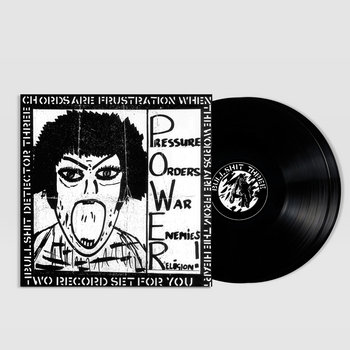
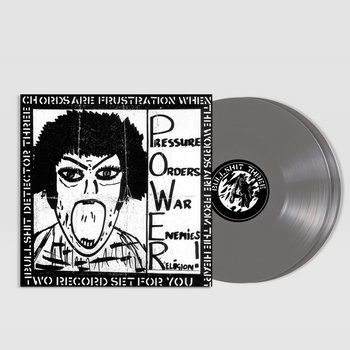




2 x Vinyl LP, Vinyl Box Set




For all this, the Bullshit Detector compilations also introduced some bands that would make their mark over the long term. Chumbawamba, Amebix, Omega Tribe, and an early, pre-grindcore Napalm Death all made their recording debuts across the three records. “We had almost no musical ability but were passionate believers in the DIY aesthetic—if they can do it, we can do it,” remembers Miles “Rat” Ratledge, Napalm Death’s original drummer. “Crass wanted to use the first song on the tape, ‘The Good Book,’ which was a concern for us as, in our opinion, the song wasn’t one of our best. We asked if the song ‘Crucifixion Of Possessions’ could be used instead, and luckily Crass agreed, although they had to leave out the out-of-tune guitar introduction for reasons of space.” As well as soliciting music, Crass requested artwork from contributing bands, which found its way onto the album’s gigantic, fold-out inner sleeve. “The artwork was provided by the bass player, Finbarr, who was given only a day’s notice to come up with something relevant—I think he did rather well.”
In 1982 in the northern industrial town of Burnley, a young group called Chumbawamba had just completed their first studio recording. “Our influences at the time were The Fall, Wire, Frank Zappa, and Crass,” remembers Chumbawamba guitarist Allan “Boff” Whalley.
The first three seemed unreachable, but we knew from the Crass concerts we’d been to that the band were approachable. So we sent them our mix of what I can only describe as ‘weird stuff.’ A few weeks later they wrote to say ‘Great, we’re putting you on the next Bullshit compilation!’ We’d no idea there was going to be another one; this was a pleasant shock—apart from worrying that the quality of the cassette we’d sent would be woeful.
When the album was released we found that our track—a two-minute extract of the longer piece—nestled next to a song by Passion Killers, a duo from Barnsley. We wrote to them—actually, we wrote to every band on the album to try to forge some sort of community, but surprisingly few people responded. They probably listened to our track and thought we were mad. Passion Killers did respond, and we met up; within six months they were both playing in Chumbawamba.






Vinyl LP, Vinyl Box Set




The title of Bullshit Detector came from a lyric from “Garageland,” a track from The Clash’s 1977 debut album that attested to the joys of DIY creation. From the perspective of many anarcho-punks, though, The Clash had sold out, signing to a major label and turning their sights to breaking America. It’s a situation that Chumbawamba’s Boff sends up on a wry cover of “Garageland” that appeared on Bullshit Detector II: “Our old bullshit detector cannot now be found/ Left it in the garage, but the garage fell down”.
Boff’s take on “Garageland” is a great example of anarcho-punk’s witty, satirical side. Looking back, though, the guitarist feels The Clash were an easy target. “With the creaking hindsight of 40 years of political and cultural shifts, anarcho-punk’s demonization of The Clash appears petty and misguided,” he writes. “Who can argue against the idea that bands like The Clash and the Pistols broke new ground, opened up spaces that we were able to rush into, cleared a path for us to make something out of? At the time, though, we were watching in horror as those punk icons morphed into the same old rock ’n’ roll mythology that they’d once railed against—singing about Cadillacs, wearing vintage 1950s shirts, and playing in stadiums supporting The Who.
The idea of having a Bullshit Detector—“What is it? Is it a machine? Does it stay in the garage or is it portable? I want one!”—was critical at the time, because the promises of punk were being undermined. Later, as the first wave of fired-up, activist anarcho-punks began to give way to hordes of black-clad glue-sniffing drunks who wanted to scrap at gigs, with Thatcher’s power base increasing and the miners rattling buckets in every town center, The Clash seemed like the least of our worries.”






2 x Vinyl LP, Vinyl Box Set




In early anarcho-punk records, you can hear the dream of a better, more equitable society. But by 1984, the utopian dream was beginning to fade. The bleakness of the news—famine in Africa, war in the Falklands, the looming threat of nuclear war—felt unrelenting. Crass, exhausted by seven years of frantic activity, were at the end of their tether. The third Bullshit Detector compilation is the most professionally played and best-produced. But it’s hard to shake the sense that the scene, once free-spirited and unpredictable, was beginning to calcify into a familiar sound and a checklist of concerns. Meanwhile, other adjacent sounds—grindcore, crust punk, UK hardcore—were on the rise.
The three Bullshit Detectors have been out of print since their release, but now Crass have teamed up with One Little Independent—itself run by a key anarcho-punk player, Derek Birkett of Flux Of Pink Indians—to reissue them. The label has been doing the detective work of tracking down 100 bands, but plans have been made in case any long-lost musicians coming out the woodwork. “We decided to go ahead and make it clear in the promotion that bands can get in touch with us and we’ll deal with whatever is appropriate,” says Rimbaud. “We’re never going to be able to get everyone, but if we can get half of everyone—it’s in the spirit of making it in the first place, very much hacked together.”
“The Bullshit Detector series was a beautiful idea, without a doubt,” says Boff. “It wasn’t even much about the music. It was about gathering ideas and gathering people, building a sense of community. Appearing on the album cemented the idea that yes, people were interested in what we were doing, and that was a bit of a leg-up to help keep us slogging away driving to gigs at peace camps and benefits in scout huts.”
“I don’t like the word proud,” says Rimbaud,
but I’m proud for all those kids whose stuff is on it. Because they were saying, Yeah, we can do it, we can do what maybe we haven’t entirely done it, but at least we’re still fucking trying. That’s what matters to me. I mean, Crass said that there is no authority but yourself. And I still hold very dear to that as a sort of code. You know, live your life, find your own garden, and then share it. See what happens.
Steve Ignorant puts it more succinctly. “If you want to know what life was like in England in 1980, just read the lyrics of Bullshit Detector. It’s all there.”







